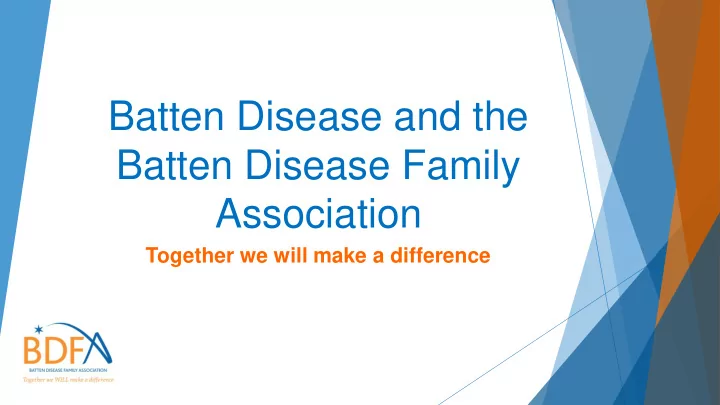

Batten Disease and the Batten Disease Family Association Together we will make a difference
Neuronal Ceroid Lipofuscinoses NCLs Autosomal recessive inheritance Classified according to the gene identified Over 400 mutations have been found in 14 different genes. There are 14 types of Batten disease which have currently been discovered. Each child will present very similar symptoms but at very differing speeds Mutations in the genes cause deficiencies resulting in abnormal storage of proteins and lipids in neurons and other cells leading to symptoms. There is currently NO cure and NO treatments for this disease. Although there are clinical trials and lots of research is happening.
NCL Classification CLN1 – Infantile CLN2 – Late Infantile CLN3 – Juvenile CLN5 – Variant Late Infantile CLN6 – Variant Late Infantile CLN7 – Turkish Variant Late Infantile CLN8 – Variant Late Infantile CLN10 – Congential CLN14 – ?
Symptoms – CLN1 disease Children are healthy from birth. From 6 months – 1 year symptoms appear Development begins to slow down They often have more difficulty sleeping and my be irritable. Some infants develop repetitive hand movements They lose their developmental skills such as walking, crawling and talking. Children develop hard to control seizures around 2 years old. Vision deteriorates until the children can no longer see. They lose control of all muscles and cannot swallow. Death occurs around 5 years old
Symptoms CLN2,5,6,7,8 diseases Children are healthy at birth. At around 2-3 years old they start to experience seizures. Their vision will also start to deteriorate until they can no longer see. They will then lose the ability to walk and then talk They lose the ability to swallow. They lose their short term memory but their long term memory stays in tact They lose control of their muscles The seizures are very hard to control Death occurs between 6 & 12 years old. Many children die at 6 years old.
Symptoms of CLN3 disease Children are healthy when they are born. Between the ages of 5-6 they will begin to lose their sight. Between the ages of 10-11 they will begin to experience seizures. Children experience hallucinations They lose their short term memory They lose the ability to walk in their mid teens They lose the ability to talk around the same time. They often experience behaviour issues and anxiety issues because of the disorganisation in the brain. Death occurs between 15-30 years old. This progression is usually slower than the other NCL’s
Estimated 150-200 UK Batten children and Young Adults We currently know of: 6 CLN1 30 CLN2 36 CLN3 10 variant/others
The BDFA was founded in 1998 by a group of parents with affected children and with the help of Contact a Family and Seeability. The aim then, as now, was to ensure that no family face the devastating diagnosis of Batten disease alone.
Mission To ensure that everyone living with a diagnosis of Batten disease has access to the best quality services and support to enable them to live life to the full and to change lives by funding research into potential therapies and ultimately a cure.
The BDFA has three main aims To support families and To raise awareness To directly fund the professionals who and advocate for better research into potential work with them services and therapies and treatments ultimately a cure
What we do
Family Support and advocacy Support and signposting Training workshops Leaflets and Information Write letters and advocacy Educational support and training Equipment and Benefits EHCs Small grants scheme Batten CNS Family conference Research and trials information Support on trials Grant and wish applications Connect families Connect professionals
NCL Awareness Social media Website Newsletters and Batten Bulletin Alliances and affiliations Parliamentary advocacy and lobbying Batten disease awareness day Press coverage Resources, leaflets Supporter fundraising
NCL Research The BDFA funds research into all forms of the NCLs and includes Support and Advocacy for families on BMN190 clinical trial in the UK and worldwide Dem-Child International registry NCL Mutation Database Research into underlying disease mechanisms Research into potential therapies and ultimately a cure
Research Funding • Gene Therapy to treat the visual failure in Batten disease. • CLN1 pre clinical research with Professor Sandy Hoffman in Texas CLN2 drug discover work in zebra fish model • with Dr Claire Russell at RVC Sparks Medical Research Charity • collaboration • Professor Jon Cooper, cell-based model of CLN3 disease
Future plans for the BDFA Further research funding in both 1. basic mechanisms and translational research towards clinical trials Development with NHS England of 2. specialized Batten service and introduction of new therapies Expansion of support and 3. advocacy service Expansion of education advocacy 4. service Scoping and recruitment of Adult 5. Batten Clinical Nurse Specialist Create new funding initiatives to 6. ensure continuation of our growth
Thank you and questions?
Recommend
More recommend